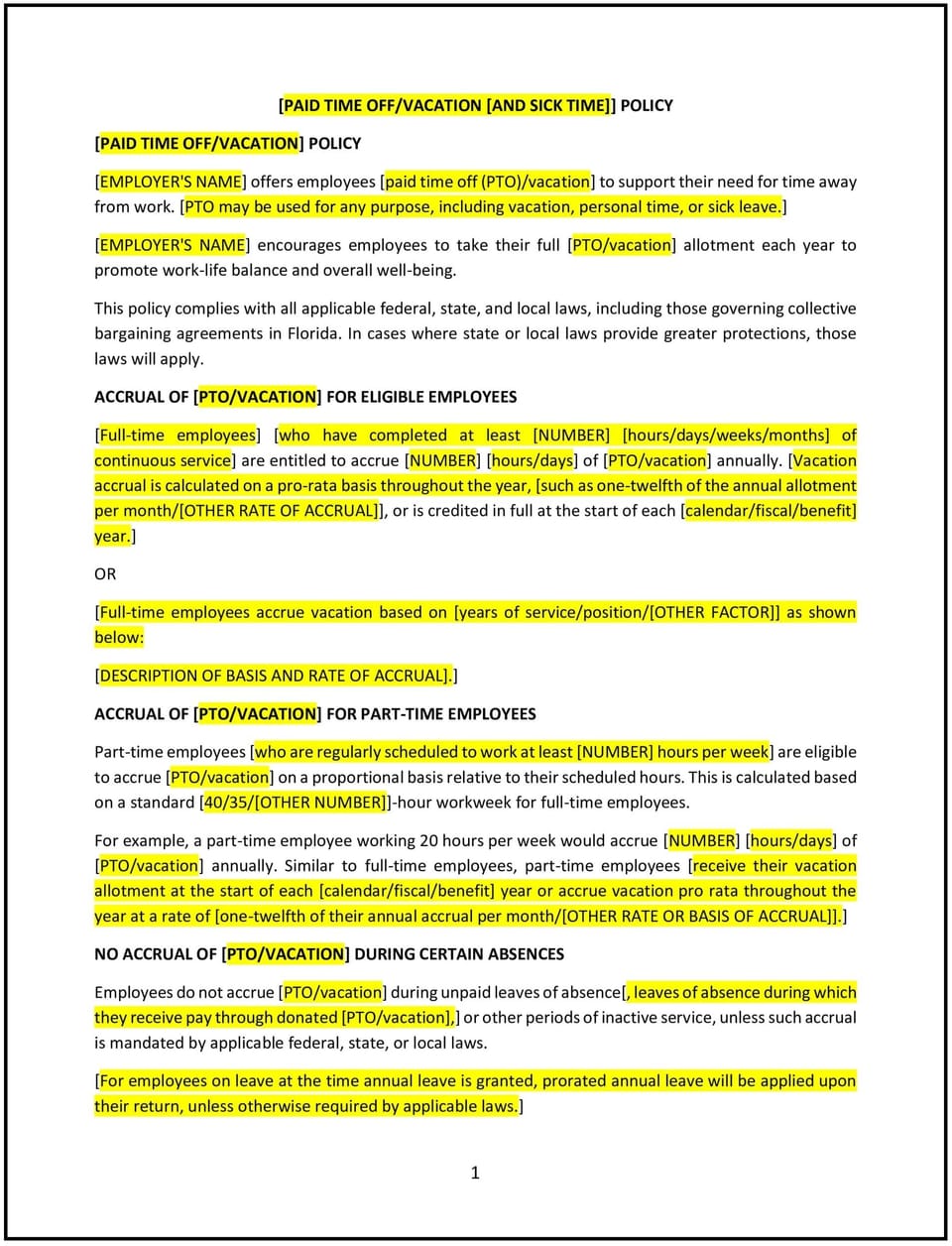Vacation policy (Florida): Free template

Vacation policy (Florida)
A vacation policy helps Florida businesses establish guidelines for managing employee time off for rest and relaxation. This policy outlines procedures for requesting, approving, and managing vacation time while maintaining operational efficiency. It is designed to promote work-life balance, reduce stress, and provide clear expectations for managing vacation requests.
By implementing this policy, businesses in Florida can demonstrate their commitment to employee well-being, enhance operational efficiency, and align with the state’s focus on fostering a supportive and responsible workplace.
How to use this vacation policy (Florida)
- Define eligibility criteria: Clearly specify which employees qualify for vacation time, such as full-time or part-time staff.
- Establish accrual rates: Outline how vacation time accrues for employees, including the rate of accrual and any maximum caps.
- Address request procedures: Explain how employees should request vacation time, including whom to contact and how to document requests.
- Specify approval criteria: Explain how businesses should evaluate vacation requests based on factors such as job requirements, team needs, and operational impact.
- Communicate expectations: Clarify the business’s expectations regarding scheduling, work coverage, and returning to work after taking vacation.
- Communicate the policy: Share the policy with employees during onboarding and through regular communications to ensure awareness and understanding.
- Monitor adherence: Regularly review how the policy is applied and address any concerns or discrepancies promptly.
- Update the policy: Periodically assess the policy to reflect changes in workplace dynamics, legal standards, or business needs.
Benefits of using this vacation policy (Florida)
This policy offers several advantages for Florida businesses:
- Promotes work-life balance: Supporting vacation time helps employees manage personal and professional responsibilities more effectively.
- Reduces stress: Providing clear guidelines helps employees plan and take time off without added work-related pressure.
- Builds trust: A clear policy demonstrates the business’s commitment to fairness and employee well-being.
- Aligns with community values: Reflects Florida’s emphasis on work-life balance and mutual respect in the workplace.
- Enhances reputation: Demonstrates the business’s dedication to ethical practices and employee support.
- Improves retention: Offering vacation time contributes to higher employee satisfaction and loyalty.
- Supports growth: A robust policy facilitates a more engaged and productive workforce.
Tips for using this vacation policy (Florida)
- Communicate clearly: Ensure employees understand the policy by providing written materials and discussing it during meetings or training sessions.
- Train managers: Educate supervisors on how to handle vacation requests fairly and consistently.
- Be flexible: Allow for reasonable adjustments based on individual circumstances to ensure effectiveness.
- Track usage: Maintain records of vacation requests and approvals to monitor trends and ensure fairness.
- Stay informed: Keep up with changes in societal norms, workplace expectations, or state-specific guidelines that may affect vacation practices.
- Encourage feedback: Solicit input from employees to identify areas for improvement and ensure the policy meets their needs.
- Review periodically: Assess the policy’s effectiveness and make updates as needed to reflect changes in workplace dynamics or business goals.
Q: Why should Florida businesses adopt a vacation policy?
A: Businesses should adopt this policy to promote work-life balance, reduce stress, and demonstrate their commitment to supporting employees in taking time off.
Q: What types of employees should be eligible for vacation time?
A: Businesses should consider full-time and part-time employees as eligible for vacation time, ensuring fairness and consistency.
Q: How should businesses handle vacation requests?
A: Businesses should evaluate requests based on individual needs, job requirements, and team needs, ensuring that decisions are fair and transparent.
Q: Should businesses set limits on how much vacation time can be accrued?
A: Businesses should consider setting reasonable limits on vacation accrual to ensure operational efficiency and fairness.
Q: How can businesses ensure accountability with vacation time?
A: Businesses should establish clear expectations for scheduling, work coverage, and returning to work after taking vacation, ensuring that operations run smoothly.
Q: What should businesses do if an employee does not use their vacation time?
A: Businesses should encourage employees to take their earned vacation time and consider policies that allow for carry-over or payout of unused time, as appropriate.
Q: How often should businesses review the policy?
A: Businesses should review the policy annually or whenever there are significant changes in workplace dynamics, legal standards, or business operations.
This article contains general legal information and does not contain legal advice. Cobrief is not a law firm or a substitute for an attorney or law firm. The law is complex and changes often. For legal advice, please ask a lawyer.


